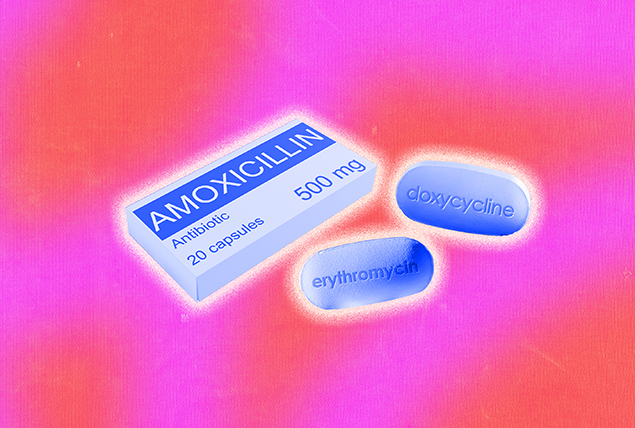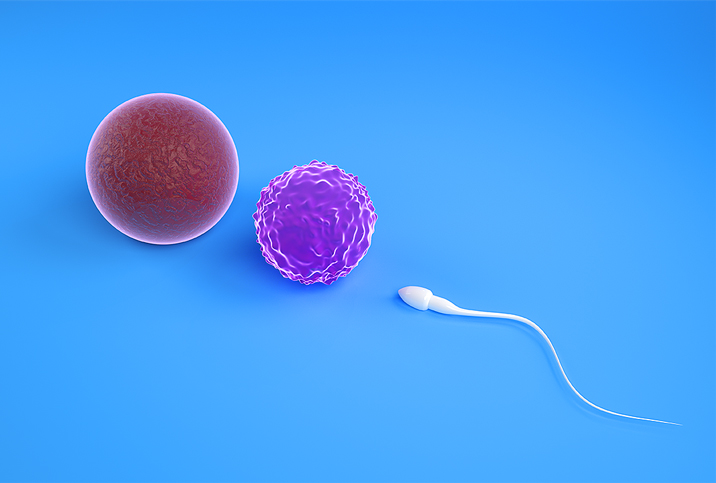Treating Chlamydia (and What Happens if You Don't)

Chlamydia is one of the most commonly reported sexually transmitted diseases (STDs) in the world, and thankfully, it's relatively easy to treat. If the infection goes untreated, however, the consequences can be serious.
Untreated chlamydia can have ramifications on your sexual health and beyond, so knowing the facts is essential.
Testing and treatment
If you're experiencing chlamydia symptoms, you should get tested immediately so you can get a proper diagnosis and begin treatment.
"Common symptoms of [an] initial chlamydia infection include burning urination, penile discharge, pelvic pain, painful intercourse, increased urinary frequency and itching in the private parts," said Maneesh Singhal, M.D., an internal medicine specialist in Sonora, California, and a medical consultant at SuperPill, an online pharmacy.
Getting diagnosed with chlamydia is straightforward, completed by a swab or urine test. Once you receive your diagnosis, your doctor prescribes medication.
"Chlamydia is usually treated with oral antibiotics," said Kate Tulenko, M.D., M.P.H., former director of the U.S. government's global health workforce project and current CEO and founder of Corvus Health, based in Alexandria, Virginia.
Sometimes antibiotics need to be taken for a longer period of time.
"The duration of antibiotics depends on the severity of infection," Singhal advised. "Patients need to follow the recommendations of their physician regarding the type and duration of antibiotics."
The two most common antibiotics used to treat chlamydia are doxycycline and azithromycin, according to the National Health Service (NHS) in the United Kingdom. Thankfully, both of those options are relatively cheap, Singhal added. If you have allergies, or are pregnant or breastfeeding, your doctor may prescribe something different.
Some people may experience side effects, such as nausea, stomach ache and diarrhea, but these complications are usually mild.
It's important to note that while medication can clear up the current round of chlamydia, it doesn't give you immunity going forward. Recurrent chlamydia is common, especially in people who have sex with multiple partners and/or unprotected sex. If you do experience symptoms again, you'll need another diagnosis and treatment plan.
Antibiotics also can't address any permanent damage created by the chlamydia infection, such as pelvic inflammatory disease (PID) or the risk of ectopic pregnancy, in which the fertilized egg implants outside the uterus.
Chlamydia and your sexual health
A major concern with untreated chlamydia is PID. In women, a chlamydia infection can extend to the uterus, fallopian tubes and pelvic cavity, Tulenko said. Once the infection is in the pelvic cavity, it can cause pelvic inflammatory disease.
Symptoms of PID include:
- Bleeding
- Burning during sex and urination
- Fever
- Lower abdominal pain
- Pain during sex
- Unusual vaginal discharge
Long-term complications of pelvic inflammatory disease include chronic pain and infertility caused by scarring and blockages in the fallopian tubes.
In men, chlamydia can lead to epididymitis, an inflammation of the coiled tube beside each testicle, causing fever, swelling and pain in the scrotum. Another possible complication, albeit rare, is prostatitis, a prostate gland infection.
Prostatitis can cause:
- Back pain
- Chills
- Fever
- Pain during and after sex
- Painful urination
All of these potential complications can be a painful damper on your sex life. Treating chlamydia quickly so you don't increase your risk of further complications is crucial to maintaining overall sexual health.
People who have chlamydia, and other STDs, may be at an increased risk of contracting HIV due to the behaviors, such as multiple partners, rough sex and not using protection, that led to contracting chlamydia.
Chlamydia and erectile dysfunction
Untreated prostatitis may have some serious consequences, such as erectile dysfunction (ED).
"Chronic prostatitis affects the penile tissue, which in turn leads to ED," Singhal explained. "Two main mechanisms in this relationship may include inflammatory agents released during inflammation [and] neural damage due to the expansion of inflammation to the periprostatic genital nerves. These factors can cause ED."
In severe conditions, it's possible for a patient to continue to suffer erectile dysfunction even after the chlamydia infection is cleared, he added.
Erectile dysfunction, the consistent inability to get and keep an erection, can lead to lower libido and mental health struggles.
Chlamydia and reproductive health
In women, one of the major concerns of untreated chlamydia is the serious ramifications it can have on reproductive health.
If chlamydia turns into pelvic inflammatory disease, infertility may occur. Untreated chlamydia can increase the risk of ectopic pregnancy.
"Achieving success in getting pregnant can become nearly impossible for patients with untreated chlamydia, and women with the disease are more likely to have a pregnancy outside of the womb that can become a medical emergency known as an ectopic pregnancy," said Stewart Parnacott, C.R.N.A., a nurse anesthetist in Atlanta.
Chlamydia is a major concern for pregnant women and their babies. Pregnant women with chlamydia are at risk for a number of pregnancy complications, including preterm labor and low birth weight, Tulenko explained.
The infection can impact the baby, passing through the birth canal and to the baby as it's born. About 50 percent of infants born to a mother with chlamydia become infected, according to the American Academy of Pediatrics. Babies born with chlamydia can suffer eye and/or lung infections.
Chlamydia and your birth control
Another surprising connection between chlamydia and your sexual health lies in your choice of birth control, specifically, an injection of depot medroxyprogesterone acetate, better known as the Depo-Provera shot.
"A little-known group of people with a higher risk of contracting [STDs] like chlamydia are people who choose the injectable form of birth control known as Depo-Provera," Parnacott said. "This medication is more frequently referred to by patients as 'the depo shot' and puts women at nearly a threefold increase in the risk of contracting chlamydia from an infected partner."
More research on the topic is needed, but the depo shot may increase your risk of chlamydia and gonorrhea, according to a 2004 joint study between the National Institute of Child Health and Human Development at the National Institutes of Health and the U.S. Agency for International Development's Office of Population and Reproductive Health.
If you take the Depo-Provera shot and are worried about your risk of contracting an STD, talk to your doctor about alternate birth control options.
Chlamydia and arthritis
Another unexpected complication of chlamydia is reactive arthritis, known as Reiter's syndrome, a form of arthritis caused by an infection in another part of the body, often the genitals, urinary tract or intestines.
Reiter's syndrome symptoms can include:
- Eye inflammation
- Joint stiffness
- Low back pain
- Pain
- Rashes and sores
- Swollen fingers and toes
- Tendon and ligament inflammation
- Urinary problems
Reactive arthritis caused by chlamydia is rare, and in most cases, the symptoms come and go, and may eventually go away altogether.
Early diagnosis is key
Chlamydia is treated very easily and quickly if detected early. Untreated cases can lead to serious consequences, such as erectile dysfunction and infertility. If you experience any symptoms of chlamydia, it's crucial to schedule an STD test with your doctor, local clinic or Planned Parenthood office.


















